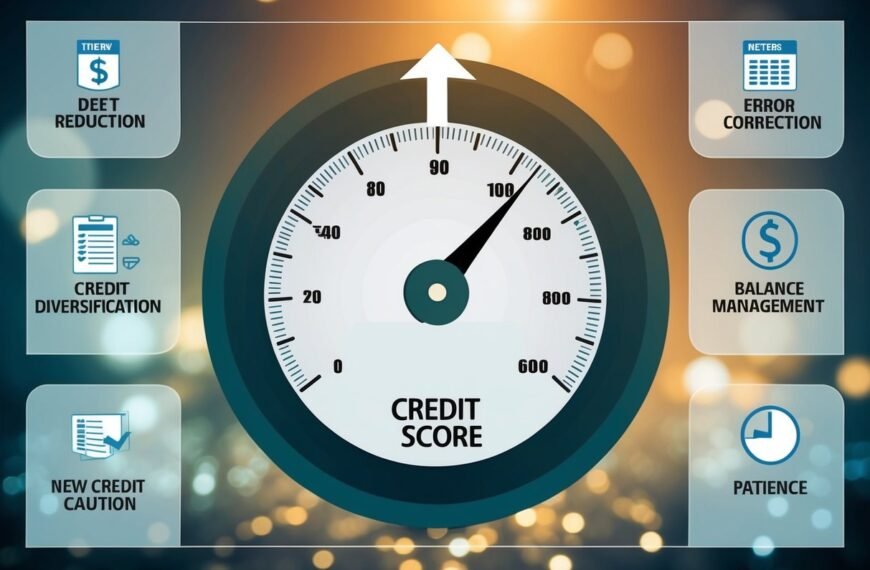
Explore the earlier installment of this series in Part 6-Credit Score Improvement Techniques to build a comprehensive understanding before delving into this chapter.
In this chapter, discover the powerful connection between credit scores and financial opportunities in this informative article. Exploring topics such as qualifying for lower interest rates, homeownership and mortgage rates, lower insurance premiums, access to premium credit cards, rental opportunities, and enhanced financial flexibility, this article delves into the ways credit scores can impact your financial life. Learn how a higher credit score can secure lower interest rates, how credit scores affect mortgage eligibility, and strategies for lowering insurance premiums. With insights into the perks of premium credit cards and the impact of credit on rental applications, this article highlights the importance of prioritizing credit health for long-term benefits and financial stability.
Qualifying for Lower Interest Rates
The Role of Credit Scores in Loan Approvals
When it comes to applying for a loan, whether it be a personal loan, a car loan, or a home loan, lenders take into consideration various factors before deciding whether to approve your application. One crucial factor that lenders closely examine is your credit score. Your credit score is a numerical representation of your creditworthiness and financial responsibility. It is a measure of how likely you are to repay your debts based on your past borrowing history, payment history, and other financial behaviors.
Lenders use credit scores as a way to assess the level of risk they face when lending money to an individual. A higher credit score indicates a lower risk, while a lower credit score suggests a higher risk. This is why having a good credit score plays a significant role in loan approvals.
How a Higher Credit Score Can Secure Lower Interest Rates
One of the most significant advantages of having a higher credit score is the opportunity to secure lower interest rates on loans. Lenders typically reserve their lowest interest rates for borrowers with excellent credit scores. By demonstrating that you have a solid credit history and a responsible borrowing track record, you can negotiate for better loan terms and save a substantial amount of money in interest payments over the life of the loan.
For example, let’s say you’re looking to purchase a new car and need to take out a loan of $25,000. With a credit score of 750 or above, you may qualify for an interest rate of 3.5% on a five-year loan term. However, if your credit score falls below 600, you could be faced with an interest rate of 10% or higher. This significant difference in interest rates can lead to a difference of thousands of dollars in interest payments over the life of the loan.
The Long-Term Savings of Lower Interest Loans
Lower interest rates not only result in immediate savings on your monthly loan payments but also lead to significant long-term savings. When you secure a loan with a lower interest rate, you’ll owe less money in interest over the life of the loan. This means you’ll be able to pay off the loan faster and save more money in the process.
Consider a 30-year mortgage loan of $300,000. With a credit score of 800, you may qualify for an interest rate of 3%, resulting in a total interest payment of $155,332 over the course of the loan. However, with a credit score of 600, you may be offered an interest rate of 5%, resulting in a total interest payment of $279,767. The $124,435 in savings by having a higher credit score can be used for other financial goals or invested for the future.
By maintaining and improving your credit score, you are positioning yourself for long-term financial success and maximizing your potential savings.
Homeownership and Mortgage Rates
The Dream of Homeownership
Owning a home is a dream shared by many, offering stability, security, and the pride of homeownership. However, the road to homeownership often involves taking out a mortgage, which is a significant financial commitment. Lenders carefully assess your creditworthiness and credit score before approving a mortgage, as they want to ensure that you have the financial capability to make consistent mortgage payments.
How Credit Scores Affect Mortgage Eligibility
As with any loan, your credit score plays a crucial role in determining your eligibility for a mortgage. Lenders use your credit score to gauge your ability to make mortgage payments on time, as well as your overall financial responsibility. A higher credit score demonstrates that you are a trustworthy borrower and increases your chances of being approved for a mortgage.
Lenders typically set minimum credit score requirements for mortgage applicants. While these requirements may vary, a credit score of 620 or above is generally considered the minimum threshold to qualify for a conventional mortgage. Remember that the higher your credit score, the more favorable mortgage terms and interest rates you are likely to secure.
Lower Mortgage Rates for Those with Good Credit
Securing a mortgage with a lower interest rate can make a significant difference in your monthly mortgage payments and overall cost of homeownership. Just as with other loans, borrowers with higher credit scores are rewarded with lower interest rates on their mortgages.
A lower interest rate not only reduces your monthly mortgage payments but also allows you to build home equity faster. With lower monthly payments, you can allocate more funds towards your principal balance, leading to quicker debt repayment and potential savings in interest payments over time.
For instance, let’s consider a 30-year fixed-rate mortgage of $250,000. With a credit score of 700, you may qualify for an interest rate of 4%, resulting in a monthly payment of $1,193. However, if your credit score drops to 600, you may face an interest rate of 5%, resulting in a monthly payment of $1,342. Over the course of the loan, the higher interest rate would cost you an additional $44,280, showcasing the importance of maintaining good credit when seeking homeownership.

Lower Insurance Premiums
The Relationship Between Credit and Insurance
You may be surprised to learn that your credit score can also affect the cost of your insurance premiums. Insurance companies use credit-based insurance scores, which are derived from your credit history, to assess your likelihood of filing a claim. Studies have shown that there is a correlation between a person’s credit history and the likelihood of insurance claims being filed. As a result, insurance companies use credit-based insurance scores as a tool to evaluate risk and determine insurance premiums.
How Credit-Based Insurance Scores Are Used
Credit-based insurance scores are calculated based on various factors, including your payment history, outstanding debt, length of credit history, and types of credit used. By analyzing these factors, insurance companies create a numerical score that helps them predict the likelihood of future insurance claims.
Insurance premiums are typically calculated based on a combination of factors, including your credit-based insurance score. Individuals with higher credit-based insurance scores are often seen as lower-risk policyholders and may enjoy lower insurance premiums as a result.
Strategies for Lowering Insurance Premiums
Improving your credit score can directly impact the cost of your insurance premiums. Here are some strategies to help you lower your insurance costs:
- Pay bills on time: Consistently paying your bills by the due date helps demonstrate financial responsibility and can positively impact your credit-based insurance score.
- Reduce outstanding debt: Lowering your overall debt-to-credit ratio can improve your credit-based insurance score and potentially lead to lower insurance premiums.
- Monitor your credit report: Regularly reviewing your credit report allows you to identify any errors or inaccuracies that may be negatively impacting your credit-based insurance score. Correcting these errors can help improve your score and reduce insurance costs.
By taking proactive steps to improve your credit and maintain a good credit-based insurance score, you can lower your insurance premiums and save money over time.
Access to Premium Credit Cards
The Perks of Premium Credit Cards
Premium credit cards offer a range of exclusive benefits and perks that are not typically available with standard credit cards. These benefits can include access to airport lounges, concierge services, travel insurance, cashback rewards, and much more. Owning a premium credit card can elevate your financial experience and provide you with additional value for your spending.
Qualifications for Premium Cardholders
To qualify for a premium credit card, lenders often look for individuals with excellent credit scores and a strong credit history. The eligibility criteria for premium cards may include a minimum credit score requirement, a certain income level, and a record of responsible credit card usage. By maintaining a high credit score, you increase your chances of becoming a premium cardholder and enjoying the exclusive perks that come with it.
It’s important to note that premium credit cards may come with higher annual fees compared to standard credit cards. However, the benefits and rewards often outweigh the fees for those who take full advantage of the card’s offerings.
Leveraging Credit Card Rewards and Benefits
Premium credit cards offer various rewards programs and benefits that can help you save money and enhance your lifestyle. From earning cashback on everyday purchases to receiving travel credits and discounts on hotel bookings, the rewards and benefits can significantly offset the costs associated with owning a premium credit card.
When choosing a premium credit card, consider your spending habits and the types of rewards that align with your lifestyle. By strategically using your premium credit card, you can maximize the value of the rewards and benefits it offers, effectively making your everyday expenses work in your favor.

Rental Opportunities
Credit Checks in the Rental Process
When looking for a rental property, potential landlords often conduct credit checks as part of their tenant screening process. They want to ensure that the individuals they rent to have a history of responsible financial behavior and are likely to pay their rent on time.
Landlords typically request permission from prospective tenants to access their credit reports. They are particularly interested in the tenant’s payment history, outstanding debts, and any negative marks such as bankruptcies or evictions. By reviewing this information, landlords can make informed decisions about who they choose to rent their property to.
Landlord Expectations for Tenant Credit
Good credit is highly valued by landlords as it provides reassurance that a prospective tenant is financially stable and reliable. A higher credit score can indicate a lower risk for landlords, which increases your chances of being approved for a rental property.
In addition to the credit check, landlords may also consider other factors such as income, employment history, and rental references when evaluating potential tenants. However, having a solid credit score can often give you an edge over other applicants and increase your chances of securing your desired rental property.
The Impact of Credit on Rental Applications
Your credit score and credit history can heavily influence the outcome of your rental applications. A higher credit score can help you stand out as a responsible and trustworthy tenant, making it easier to find and secure the rental property you desire.
It’s important to regularly monitor your credit report and address any negative items or errors that may be impacting your credit score. By maintaining a good credit score, you increase your chances of success in the competitive rental market and gain access to a wider range of rental opportunities.
Enhanced Financial Flexibility
Financial Freedom and Flexibility
Good credit provides you with financial freedom and flexibility, allowing you to pursue various opportunities and goals. Whether you’re aiming to start a business, buy a new car, or invest in real estate, having a solid credit score opens up a world of possibilities.
A good credit score demonstrates your ability to responsibly manage your finances and meet your financial obligations on time. This favorable credit history positions you as a reliable borrower, making it easier to access the funds you need to achieve your financial objectives.
Emergency Funds and Financial Security
Life is full of unexpected events, and having a good credit score can provide an extra layer of financial security. In emergency situations, such as a medical crisis or unexpected home repairs, you may need access to funds quickly. The availability of credit can provide you with the means to address these unforeseen expenses promptly, without derailing your financial stability.
By maintaining good credit, you can qualify for credit lines, personal loans, or credit cards with favorable terms and interest rates. These options can serve as a safety net during challenging times and help you navigate through difficult financial situations.
The Connection Between Credit and Financial Stability
Building and maintaining good credit is an essential part of achieving long-term financial stability. A higher credit score not only opens doors to better loan terms and lower interest rates, but it also helps establish a positive financial reputation. As your credit improves, you become more attractive to lenders, insurers, and landlords, giving you the ability to secure better opportunities for your future.
Good credit is a valuable asset that provides you with the confidence and flexibility to pursue your financial goals, overcome unexpected obstacles, and enjoy a secure financial future.

Conclusion
Recap of How Credit Scores Open Financial Opportunities
A good credit score is the key to unlocking numerous financial opportunities. From qualifying for lower interest rates on loans to securing your dream home, good credit allows you to achieve your goals more easily and affordably. It serves as a testament to your financial responsibility and opens the door to premium credit cards, lower insurance premiums, and a wider range of rental opportunities.
The Long-Term Benefits of Maintaining Good Credit
Maintaining good credit is not a short-term endeavor but a long-term commitment. By consistently practicing smart financial management, making timely payments, and keeping your credit utilization low, you can reap the long-term benefits of good credit. These benefits include substantial long-term savings, increased financial flexibility, and enhanced financial security.
Encouraging Readers to Prioritize Credit Health
Your credit score is a reflection of your financial health and can significantly impact your financial opportunities. By prioritizing credit health and actively working to improve and maintain a good credit score, you are investing in your financial future. Take the necessary steps to monitor your credit, address any negative marks, and make responsible financial decisions to ensure a strong credit foundation that will open doors to endless opportunities.
Discover more in Part 8-Credit Coaching for a Brighter Financial Future.







